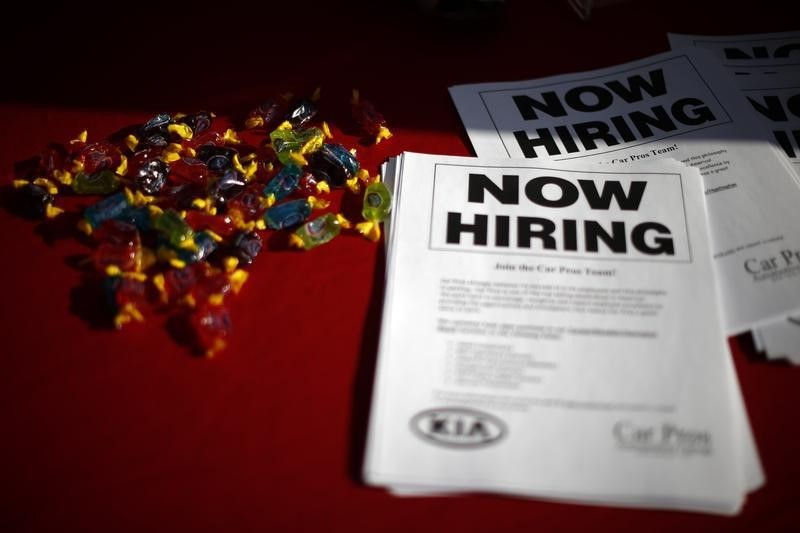Payrolls, OPEC Meeting, Global Tax, Robinhood IPO – What’s Moving Markets By Investing.com

By Peter Nurse
Investing.com –Nonfarm payrolls loom large, OPEC remains undecided over production levels, ECB’s Lagarde wants the bond-buying program to remain for now and a global corporate tax rate draws nearer. Here’s what’s moving markets on Friday, July 2nd.
1. Labour market report looms
All eyes Friday are on the U.S. Department of Labor, as it’s nonfarm payrolls day.
Despite U.S. consumer prices rising to levels not seen in over a decade, the Federal Reserve has made it clear that interest rates are not going anyway until the jobs market also shows substantial strength.
So the nonfarm payrolls release, at 8:30 AM ET (1230 GMT), always widely watched, has become the must-see number as investors try to gauge Fed thinking.
Expectations at the start of the week were for 700,000 jobs to have been filled last month, up from 559,000 in May. Both ADP (NASDAQ:ADP)’s monthly report and this week’s initial jobless claims (the latter of which covers a period after the cut-off point for the labour market report) were stronger than expected, and chatter in the market suggests the ‘whisper’ number is now higher.
2. Crude remains elevated after OPEC surprise
Crude oil prices edged lower Friday, but remained at very high levels after a meeting of top producers failed to agree on future production levels.
By 6:30 AM ET, U.S. crude was down 0.2% at $75.09 a barrel, after climbing above $75 during the previous session for the first time since 2018, while Brent was down 0.3% at $75.63, after adding more than 8% last month.
The alliance between the Organization of the Petroleum Exporting Countries and others, most notably Russia, postponed its decision on Thursday to return more oil to the market after the United Arab Emirates blocked the deal at the last minute.
The group, known as OPEC+, appeared to have come to a preliminary agreement to boost output by 400,000 barrels a day each month from August to December before the UAE intervened, demanding a higher production quota.
The meeting will be reconvened Friday, but if there isn’t an agreement then the group would continue with current production levels, a situation that would most likely lead to still-higher prices and a rapid breakdown in production discipline across the bloc.
3. Global corporate tax rate
A global minimum corporate tax rate of 15% took a step near to becoming reality, when 130 countries, representing more than 90% of global GDP, backed the agreement at talks hosted by the Organization for Economic Cooperation and Development.
The OECD said such a tax could yield around $150 billion in additional global tax revenues annually, with the new rules shifting taxing rights on more than $100 billion of profits from multinational companies to countries where the profits are earned.
Technical details are to be agreed by October so that the new rules can be implemented by 2023, but there are still bridges to cross.
Ireland was among a number of low-tax countries, including fellow EU members Estonia and Hungary, that declined to sign the agreement, saying it was unacceptable in its current form.
Ireland has a corporate tax rate of 12.5%, one of the factors that has helped convince a number of the world’s biggest multinationals to locate there, employing over 10% of the country’s workforce. The deal would still need to be passed into EU law, and that will require unanimous backing from all EU members.
4. U.S. stocks seen higher; J&J receives positive Covid study
U.S. stocks are seen edging higher Friday, but trading ranges are tight as investors await the employment report.
By 6:30 AM ET, Dow Jones futures were up 10 points, or less than 0.1%, S&P 500 futures were 0.1% higher and Nasdaq 100 futures climbed 0.2%.
Wall Street continued to press higher Thursday, adding to the strong gains seen in the first half of the year as vaccinations allowed the economy to reopen against the backdrop of massive levels of monetary and fiscal stimuli.
The S&P 500 rose 0.5% during Thursday’s regular session and notched its sixth-straight record close, finishing above 4,300 for the first time. The Dow Jones Industrial Average gained 0.4% and the tech-heavy Nasdaq Composite rose 0.1%.
Aside from the nonfarm payrolls release, investors will also be keeping an eye on Johnson & Johnson (NYSE:JNJ) stock, after the drugmaker reported that a new study indicated that its single-shot vaccine offered strong protection against the highly transmissible delta variant of the Covid-19 virus.
5. Robinhood IPO
The brokerage that has led the surge in retail trading in stocks over the last couple of years is going public. Robinhood Markets published its plans for what may be the most eagerly awaited float of 2021 on Thursday.
Among the more interesting details published in its filing were its operational numbers: the company’s user numbers have doubled and revenue has risen fourfold in the year through the first quarter, with over 80% of that revenue coming from the controversial practice of selling its order flow on to third parties, such as hedge fund Citadel. T
But the company also reported a net loss of $1.4 billion for the period after borrowing $3.5 billion via convertible bonds to backstop the wave of trading orders.
It also revealed a number of investigations by prosecutors and regulators, including received requests for information from the U.S. Justice Department and the U.S. Securities and Exchange Commission.
The company earlier this week paid some $70 million to regulatory body FINRA to remove one of the largest litigation risks against it, settling allegations that it caused customers “widespread and significant” harm in various different incidents over recent years.

